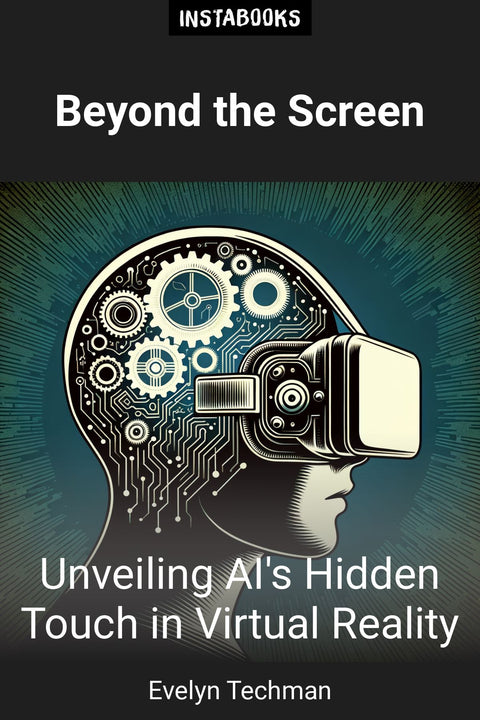
Beyond the Screen
Unveiling AI's Hidden Touch in Virtual Reality
Included:
✓ 200+ Page AI-Generated Book
✓ ePub eBook File — read on Kindle & Apple Books
✓ PDF Print File (Easy Printing)
✓ Word DOCX File (Easy Editing)
✓ Hi-Res Print-Ready Book Cover (No Logo Watermark)
✓ Full Commercial Use Rights — keep 100% of royalties
✓ Publish under your own Author Name
✓ Sell on Amazon KDP, IngramSpark, Lulu, Blurb & Gumroad to millions of readers worldwide
Introduction
In the constantly evolving landscape of technology, the integration of Artificial Intelligence (AI) within Virtual Reality (VR) has ignited a new wave of psychological transformations. As we step into 2025, the implications of AI's hidden influence on human perception and interaction are profound and multifaceted. This book, "Beyond the Screen: Unveiling AI's Hidden Touch in Virtual Reality," serves as a deep dive into the psychological effects of AI technologies in VR ecosystems, meticulously unraveling the layers of their impact.
The Evolution of VR Therapy
As mental health challenges surge worldwide, VR therapy has emerged as a revolutionary approach to treatment. Through immersive experiences, individuals confronting anxiety disorders or depression can find solace and clarity. We will explore the cutting-edge applications that leverage AI to personalize these therapies, offering users unprecedented support. From exposure therapy for phobias to guided meditations designed for stress relief, discover how VR is reshaping mental health.
AI Integration and User Experience
What does it mean for AI to enhance real-life therapy in a virtual landscape? With AI integration, VR simulations become realistic and adaptive to each individual's needs. This book investigates the nuances of how AI-driven narratives and multisensory environments engage users, ultimately aiming to foster improved emotional well-being and therapeutic outcomes. Behind the scenes, however, a pressing concern emerges—the ethical implications of user awareness and consent.
The Ethics of AI in Therapy
As we embrace innovative therapies within VR, we must address the ethical conundrums that accompany them. How do the benefits of AI and VR weigh against the risks of user manipulation and the absence of transparency? This section discusses the importance of informed consent and the necessity for ethical standards, ensuring that users understand how AI is being harnessed in their therapeutic journey.
Future Directions and Case Studies
Looking forward, we culminate our exploration with rich case studies and research findings, painting a vivid picture of the future. How will VR and AI continue to evolve within therapeutic practices, and what does this mean for societal perception in the years to come? Readers will glean insights that are not only insightful but also vital for advocacy and defining the space between technology and mental well-being.
Table of Contents
1. Understanding VR Therapy in 2025- The Rise of VR in Mental Health
- Types of VR Therapies Available
- Patient Experiences and Outcomes
2. Artificial Intelligence: A Game-Changer
- Personalization of Therapy Sessions
- AI-Driven Insights and Analytics
- Benefits and Challenges of Integration
3. The Science Behind Human Perception
- How VR Influences Perception
- Cognitive Responses to Immersive Environments
- The Human-AI Interaction Cycle
4. AI, Ethics, and User Awareness
- Understanding Informed Consent
- Challenges of Transparency in Therapy
- User Rights and Ethical AI
5. Unpacking Anxiety Disorders through VR
- Case Study: VR for Social Anxiety
- Success Stories and Therapeutic Benefits
- Future of Anxiety Treatment in VR
6. Exploring Depression and VR Solutions
- Virtual Reality Applications for Mood Enhancement
- Interactive Scenarios for Stress Relief
- Guided Meditations and Their Impact
7. Multisensory Experiences in Therapy
- The Role of Haptic Feedback
- Creating Immersive Therapy Environments
- Impact on Patient Engagement
8. Long-term Effects of AI in Therapy
- Evaluating Long-term Outcomes
- Sustaining Improvements Post-Therapy
- The Role of Continuous Innovation
9. Cognitive Behavioral Therapy Meets Virtual Reality
- Integrating CBT Techniques with VR
- Real-Life Applications and Strategies
- Patient-Centric Approach in Therapy
10. Case Studies from 2025
- Real-World Applications of VR Therapy
- Patient Testimonials and Feedback
- Lessons Learned from Practitioners
11. Future Trends in AI and VR Therapy
- Emerging Technologies Shaping Therapy
- Predictions for the Next Decade
- Creating Ethical Frameworks for Innovation
12. Advocating for Ethical Standards
- Fostering Transparency in Therapy
- Empowering Users through Education
- Establishing Guidelines and Best Practices
Target Audience
This book is aimed at mental health professionals, researchers in psychology and technology, and general readers interested in the intersection of AI, VR, and human behavior.
Key Takeaways
- Understanding the integration of AI in VR therapy and its psychological implications.
- Exploration of ethical considerations regarding user awareness and consent.
- Insights into the future of mental health treatment using innovative technologies.
- Case studies illustrating the real-world applications and benefits of VR therapy.
- Strategies for ensuring ethical standards in the deployment of AI and VR in therapy.
